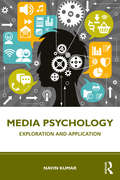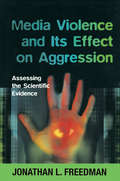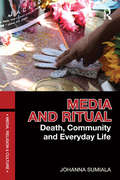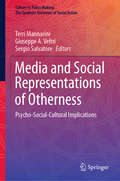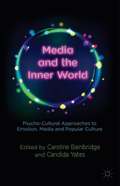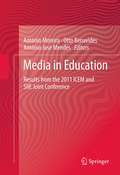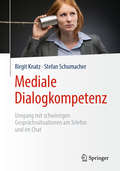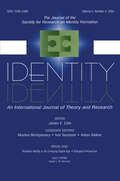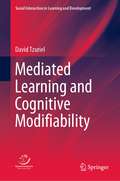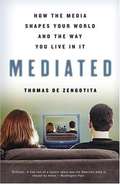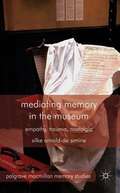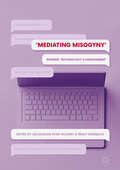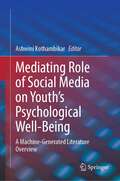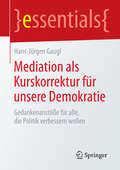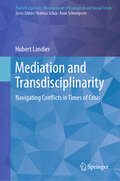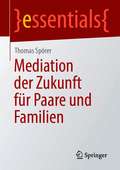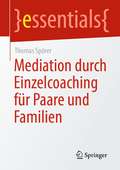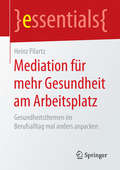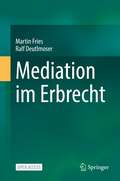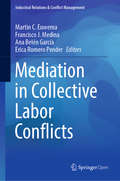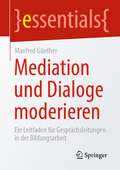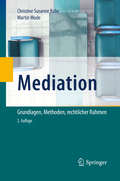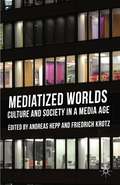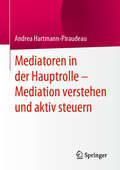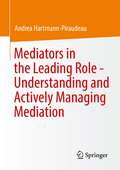- Table View
- List View
Media Psychology: Exploration and Application
by Navin KumarThis book examines media psychology as a field of study and provides a fundamental understanding of its emergence and application. It covers various key themes such as consumer behavior, mass media and advertising, media and culture, media messages and their effects on individual and group behavior in the Indian context. It highlights the role of media psychology with reference to citizenship and pedagogy and studies the emerging concept of digital altruism. The author also discusses various research methods used in this field that help to objectively evaluate the impact of mass media messages on people and people’s effect on the functioning of mass media. This comprehensive book will be useful to students and researchers of psychology, media psychology, mass-communication, consumer behavior, digital marketing, corporate communication, and media studies.
Media Violence and its Effect on Aggression
by Jonathan L. FreedmanThe scientific evidence does not support the notion that TV and film violence cause aggression in children or in anyone else. So argues Jonathan Freedman, based on his findings that far fewer than half of the scientific studies have found a causal connection between exposure to media violence and aggression or crime. In fact, Freedman believes that, taken to a more controversial extreme, the research could be interpreted as showing that there is no causal effect of media violence at all.Media Violence and its Effect on Aggression offers a provocative challenge to the accepted norms in media studies and psychology. Freedman begins with a comprehensive review of all the research on the effect of violent movies and television on aggression and crime. Having shown the lack of scientific support for the prevailing belief that media violence is connected to violent behaviour, he then explains why something that seems so intuitive and even obvious might be incorrect and goes on to provide plausible reasons why media violence might not have bad effects on children. He contrasts the supposed effects of TV violence on crime with the known effects of poverty and other social factors, and discusses the difference between television advertising, which, he argues, does have an effect, and violent programs, which do not. Freedman concludes by noting that in recent years television and films have been as violent as ever and violent video games have become more and more popular, yet during this period there has been a dramatic decrease in violent crime. He argues that this makes it highly implausible that media violence causes aggression or crime.
Media and Ritual: Death, Community and Everyday Life (Media, Religion and Culture)
by Johanna SumialaThis wide-ranging and accessible book offers a stimulating introduction to the field of media anthropology and the study of religious ritual. Johanna Sumiala explores the interweaving of rituals, communication and community. She uses the tools of anthropological enquiry to examine a variety of media events, including the death of Michael Jackson, a royal wedding and the transgressive actions which took place in Abu Ghraib, and to understand the inner significance of the media coverage of such events. The book deals with theories of ritual, media as ritual including reception, production and representation, and rituals of death in the media. It will be invaluable to students and scholars alike across media, religion and anthropology.
Media and Social Representations of Otherness: Psycho-Social-Cultural Implications (Culture in Policy Making: The Symbolic Universes of Social Action)
by Giuseppe A. Veltri Sergio Salvatore Terri MannariniThis book presents the main findings of an empirical exploration of media discourses on social representations of “otherness” in seven European countries. It focuses on the analysis of press discourses produced over a fifteen-year period (2000–2015) on three contemporary figures of otherness that challenge the identity of European societies, question the attitudes towards diversity, and pose significant challenges for policy-makers: immigration, Islam, and LGBT. The book provides a comprehensive and articulate map of how national media addresses such themes from both synchronic and diachronic perspectives, revealing patterns of continuity and discontinuity across time and space. Lastly, it discusses these patterns in the light of their cultural meanings and their influence on social and political collective behaviours.
Media and the Inner World: Psycho-cultural Approaches to Emotion, Media and Popular Culture
by Caroline Bainbridge Candida YatesThis book applies insights from the spheres of academic scholarship and clinical experience to demonstrate the usefulness of psychoanalysis for developing nuanced and innovative approaches to media and cultural analysis.
Media in Education
by Antonio Jose Mendes António Moreira Otto BenavidesWith the aim of discussing "old" and "new" teaching technologies, based on research and on the strategies and praxis of the use of technologies and methodologies in the different teaching levels, and also embracing the contribution and active participation of researchers, teachers, creators, managers and other specialists, the work will provide inputs on the following topics: Students' perspectives on media in the classroom, Students and media (as content and as tools for learning), Educational Media Design, Institutional Impact of the integration of Educational Media, Old v. New Media: what really matters, Research and Evaluation, Personal and/or social learning environments/networks, Media and inclusion, Media and informal learning, Immersive learning environments, Virtual mobility in Education, Mobile learning, Media and literacies
Mediale Dialogkompetenz: Umgang mit schwierigen Gesprächssituationen am Telefon und im Chat
by Birgit Knatz Stefan SchumacherIn vielen Berufsfeldern findet zwischenmenschlicher Dialog nicht mehr „face-to-face“ statt, sondern durch Schreiben und Lesen oder Sprechen und Hören – im Chat, am Telefon, in Messengerdiensten oder über Voicemails. Doch diese Möglichkeiten der zwischenmenschlichen Kommunikation sind auch eine Herausforderung – herausfordernd überhaupt in Kontakt zu kommen, Missverständnisse zu vermeiden, Grenzen zu setzen oder Emotionen zu balancieren. In diesem Fachbuch beschreiben die Autoren anhand zahlreicher Fallbeispiele herausfordernde und schwierige Gesprächssituationen im Chat oder am Telefon. Sie geben praktische Tipps und vermitteln Handlungsstrategien für den Umgang mit Menschen in Krisensituationen oder mit schwierigen Persönlichkeiten sowie zur Verringerung mentaler und emotionaler Belastungen, die durch die Kommunikation mit diesen Menschen entstehen.
Mediated Identity in the Emerging Digital Age: A Dialogical Perspective:a Special Issue of identity
by Hubert J. M. HermansThis book illustrates the process of mediated dialogue in a digital age. It shows that culture and self-like society and identity-are conceived as mutually inclusive and shows how technology is able to create a new form of dialogue that is very personal and very public at the same time. The first article shows that culture and self-like society and identity-are conceived as mutually inclusive. Then looks at how technology is able to create a new form of dialogue that is very personal and very public at the same time. The third paper looks at education. Next, SMS-a medium of communication is covered. The last two papers focus on television which is seen as a "social space" that offers a variety of possible self-images through audience discussion programs, its participants, and the disclosure of private stories and historical changes in the notion of space.
Mediated Learning and Cognitive Modifiability (Social Interaction in Learning and Development)
by David TzurielThis book portrays an extensive and intensive discussion of theories and research that refer to Vygotsky’s and Feuerstein’s theories of mediated learning and their effects on learning potential and cognitive modifiability. Most topics are discussed in relation to a broad spectrum of developmental and cognitive research that are under the conceptual umbrella of mediated learning and cognitive modifiability. Some topics such as neural plasticity, executive functions, mental rotation, and cognitive education are related to mediated learning, though indirectly, and therefore are included in this book. In many ways the book presents an extension of Vygotsky and Feuerstein’s theories and empirical validation in a variety of family, social and cultural contexts. The book includes a thorough analysis and summary of 50 years of research and methodology of the intimate relation between mediated learning interactions and cognitive modifiability and of dynamic assessment underlying measurement of cognitive modifiability. Special emphasis is given to Tzuriel’s dynamic assessment instruments developed during more than four decades. Tzuriel’s novel instruments are interwoven in the extensive research on parent-child interactions, siblings’ , teachers' and peers' mediation and in validation of dynamic assessment approach and cognitive education programs aimed at development of thinking skills and academic achievements.
Mediated: How The Media Shapes Your World And The Way You Live In It
by Thomas De ZengotitaA provocative, eye-opening look at the way media shapes every aspect of our lives. Just when you thought there was nothing new to say about the media, along comes a book that transcends the conventional wisdom with an original vision, one that unites our most intimate personal concerns with far-reaching historical trends in an accessible way. From Princess Diana's funeral to the prospect of mass terror, from oral sex in the Oval Office to cowboy politics in distant lands, from high school cliques to marital therapy, from hip-hop nation to climbing Mt. Everest, from blogs to reality TV to the Weather Channel, Mediated takes us on a tour of every department of our media-saturated society. And at every turn we see ourselves as we are, immersed in options, surrounded by representations, driven to unprecedented levels of self-consciousness-and obliged by these circumstances to transform our very lives into performances. Sophisticated, satirical, sometimes searing, ultimately forgiving, Mediated tackles everything we take for granted and reintroduces us to it all as if for the first time. You'll laugh, you'll squirm, you'll agree, you'll object-but you'll find more Aha! moments packed into fewer pages than you've ever come across before.
Mediating Memory in the Museum
by Silke Arnold-de SimineMediating Memory in the Museum is a contribution to an emerging field of research that is situated at the interface between memory studies and museum studies. It highlights the role of museums in the proliferation of the so-called memory boom as well as the influence of memory discourses on international trends in museum cultures.
Mediating Misogyny: Gender, Technology, and Harassment
by Jacqueline Ryan Vickery Tracy EverbachMediating Misogyny is a collection of original academic essays that foregrounds the intersection of gender, technology, and media. Framed and informed by feminist theory, the book offers empirical research and nuanced theoretical analysis about the gender-based harassment women experience both online and offline. The contributors of this volume provide information on the ways feminist activists are using digital tools to combat harassment, raise awareness, and organize for social and political change across the globe. Lastly, the book provides practical resources and tips to help students, educators, institutions, and researchers stop online harassment.
Mediating Role of Social Media on Youth’s Psychological Well-Being: A Machine-Generated Literature Overview
by Ashwini KothambikarThis book is the result of a collaboration between a human editor and an artificial intelligence algorithm to create a machine-generated literature overview of research articles analyzing the mediating role of social media on the psychological wellbeing of youth. It’s a new publication format in which state-of-the-art computer algorithms are applied to select the most relevant articles published in Springer Nature journals and create machine-generated literature reviews by arranging the selected articles in a topical order and creating short summaries of these articles. In this volume, a human counsellor psychologist used the algorithm to explore articles that present results of research about the impacts of social media on the psychological wellbeing of youth. The Internet has always been popular among youth, but during the pandemic it has attracted even more attention since many aspects of life further migrated to the digital world, thus adding substantially to Internet’s ever-increasing popularity. Today, youth spend a majority portion of their time on the Internet and an increasing amount on social media. In such digitally dependent times, this book attempts to provide insights on the positive and negative impact of the Internet and social media on youth mental health, and also provides specific observations on personality traits.
Mediation als Kurskorrektur für unsere Demokratie: Gedankenanstöße für alle, die Politik verbessern wollen (essentials)
by Hans-Jürgen GauglHans-Jürgen Gaugl gibt einen kurzen Überblick über die Wechselwirkungen zwischen Politik und Gesellschaft sowie die Bedeutung von Konflikten in der Demokratie aus der Perspektive des Konfliktmanagements. Denn sowohl seitens der Bürgerinnen und Bürger als auch in der Politik werden jene Stimmen lauter, die eine Demokratiereform fordern. Mediation, welche als Verfahren zur Beilegung von Konflikten mit allseitigem Gewinn wieder zunehmend an Bedeutung gewinnt, kann auch hier wertvolle Dienste bei einer Kurskorrektur leisten.
Mediation and Transdisciplinarity: Navigating Conflicts in Times of Crisis (Transdisciplinary Management of Ecological and Social Crises)
by Hubert LandierThe world is in crisis at every level: the planet, humanity, and all kinds of human communities, including working communities. The result is likely to be violence and chaos. And yet, man lives and can only live with others. Relationships in all their forms therefore need to be developed with a view to building a common future. However, when this in-between has been broken, when it is no longer possible to get along, when violence threatens or develops in a sometimes dramatic way, it may be necessary for both sides to call on an external third party. This book is based on decades of professional experience in the practice of corporate mediation. It examines the crucial role of mediators in resolving conflicts and fostering understanding in various contexts. By exploring real-life case studies and theoretical frameworks, the book offers valuable insights into how mediation can be a powerful tool for creating a harmonious and sustainable future.
Mediation der Zukunft für Paare und Familien (essentials)
by Thomas SpörerDer status quo der Mediation in Deutschland charakterisiert einen Zustand, der dieser Konfliktbearbeitungsform, gemessen am Bedarf, immer noch eine marginale Rolle zuschreibt. Die Gegenüberstellung einer juristischen Bearbeitung und ihrem non-juristischen Gegenpart unterstreicht zwar die Differenzen in der Vorgehensweise, blendet aber eine vorherrschende Gemeinsamkeit der beiden Systeme aus, die erst deutlich wird, wenn die Sicht darauf aus dem Blickwinkel der Betroffenen fällt. Dieser Beitrag betrachtet speziell Mediation aus der Bedürfnislage der Klientel heraus und fragt danach, wie sich diese Methode verändern muss, wenn sie den Bedürfnissen ihre Betroffenen gerecht werden möchte.
Mediation durch Einzelcoaching für Paare und Familien (essentials)
by Thomas SpörerEin Lehrsatz der Familienmediation betont die Fähigkeit des Individuums zu einer Lösungsfindung bezügl. der eigenen Angelegenheiten. Diese setzen sich zusammen aus eigenen Erfahrungen, Einschätzungen, Hoffnungen, Befürchtungen wie auch zukünftigen Aussichten. Subjektive Bedürfnisse sind somit in Einzelgesprächen bestmöglich recherchierbar und bearbeitbar. Von daher braucht Mediation außer dem Dreiergespräch speziell auch Elemente des Einzelcoachings zur Erarbeitung von einigungsrelevanten Gesprächsanteilen. Dieser Band unterstreicht die Bedeutung von Coachingelementen in der Mediation und beleuchtet außerdem die Zukunftsgestaltung als integralen Bestandteil der Mediationsarbeit über das rechtswirksame Scheidungsurteil hinaus.
Mediation für mehr Gesundheit am Arbeitsplatz: Gesundheitsthemen im Berufsalltag mal anders anpacken (essentials)
by Heinz PilartzHeinz Pilartz beschäftigt sich in diesem essential mit der Gesundheit im Arbeitsleben. Der Autor gibt praktische Hinweise für den Einsatz von Mediation im betrieblichen Kontext, veranschaulicht durch eine Vielzahl von Beispielen. Gesundheitseinschränkungen werden als ‚persönliches Thema‘ in der Arbeitswelt meist gemieden – dabei geht es besonders um die Gesundheitsstörungen, die ihre Ursache in sozialen Spannungen am Arbeitsplatz haben.
Mediation im Erbrecht
by Martin Fries Ralf DeutlmoserDieses Open-Access Buch erläutert in einer praxisnahen Darstellung, wie sich Erbstreitigkeiten durch eine Mediation zügig und für alle Beteiligten sehr befriedigend beilegen lassen. Auf der Grundlage ihrer jahrelangen Mediationspraxis berichten die Verfasser, warum sich erbrechtliche Konflikte in besonderer Weise für pragmatische Kompromisse eignen und wie es gelingt, die Erben auf diesen Weg zu bringen. Das Buch versteht sich als Ratgeber für anwaltliche Berater, Mediatoren sowie für Erblasser und Erben und gibt vielfältige Hilfestellungen für kluges Konfliktmanagement in der Gestaltung und Abwicklung der Vermögensnachfolge.
Mediation in Collective Labor Conflicts (Industrial Relations & Conflict Management)
by Ana Belén García Martin C. Euwema Francisco J. Medina Erica Romero PenderThis open access book opens up the black box of mediation in collective conflicts through the analyses and comparisons of various systems. Mediation and related third party interventions such as conciliation and facilitation are discussed as effective prevention and regulation tools for different types of collective labor conflicts. These interventions fit in a new developed five-phase model of collective conflicts in organizations, going from capacity building in latent conflicts, through conciliation, mediation and arbitration in escalating phases, to rebuilding of trust after hot conflicts. The authors promote understanding and discussion with regards to labor mediation systems, presenting comparative research on the perspectives of mediators and users of mediation. This book describes and analyses laws, regulations and practices of mediation in seventeen countries, with a relative strong emphasis on Europe. Part 1 presents theoretical frameworks on conciliation and mediation in collective labor conflicts. Part 2 presents regulations and practices in 12 European countries: Belgium, Denmark, Estonia, France, Italy, Poland, Portugal, Spain, The Netherlands, and the United Kingdom. Part 3 discusses mediation in these collective conflicts in Australia, China, India, South Africa and the USA. Part 4 offers conclusions and ways forward. This book offers analyses, good practices and developments for third party intervention in collective labor conflicts in global and local changing environments. This book is a must-read for policy makers, , social partners at different levels, as well as scholars and practitioners in industrial relations, human resources management and conflict management, particularly conciliators and mediators.
Mediation und Dialoge moderieren: Ein Leitfaden für Gesprächsleitungen in der Bildungsarbeit (essentials)
by Manfred GüntherLehrkräfte in der Erwachsenenbildung oder an Schulen sollen erfahren, wie in unterschiedlichsten Settings eine professionelle Gesprächsleitung gestaltet werden kann. Auch Sonderformen wie Kollegiale Teamberatung oder Dialoge werden vorgestellt. Zur Ausgestaltung der Gesprächsrunden werden paradoxe Interventionen, Brainstorms, Mindmaps u.v.a. gezeigt - auch Schlichtungsgespräche und der TOA. Hinzu kommen außergewöhnliche Arbeitsformen wie Streitbarer bzw. Deliberativer Dialog. Eine Liste der Einsatzgebiete und 4 Praxisbeispiele dienen der Anschaulichkeit. Der Text endet mit Infos zur Online-Moderation sowie zum IT- Einsatz.
Mediation: Grundlagen, Methoden, rechtlicher Rahmen
by Christine Susanne Rabe Martin WodeDas Buch vermittelt praxisbezogen die grundlegenden Prinzipien, Methoden und den Ablauf der erfolgreichen Mediation. Im Mittelpunkt stehen bewährte Kommunikations- und Gesprächstechniken, Beginn und Durchführung der Mediation, der Mediationsvertrag und die Abschlussvereinbarung sowie ein historischer Abriss. Übersichten veranschaulichen die Struktur des Gesprächs im Mediationsverfahren; zahlreiche Praxisbeispiele, Checklisten und Formulierungshilfen erleichtern die Umsetzung. Die klare und übersichtliche Darstellung ermöglicht das schnelle und gezielte Nachschlagen zentraler theoretischer und praktischer Aspekte der Mediation. Ein auf die Phasen der Mediation bezogenes Sachverzeichnis ermöglicht das Nachschlagen von Techniken und Checklisten, die zum jeweiligen Verfahrenszeitpunkt hilfreich sind. Das Buch richtet sich an Mediatoren in der Ausbildung ebenso wie an erfahrene Praktiker. Die 2. Auflage enthält die relevanten Ergänzungen des Mediationsgesetzes durch die ZMediatAusbV und Hinweise zur (Selbst-) Zertifizierung. Ein zusätzliches Kapitel widmet sich u.a. der Konfliktklärung in interkulturellen Kontexten und der Mediation bei Beteiligungsprozessen bei Veränderungen im Unternehmen. Auch die Herausforderungen des „internen Mediators“ sowie der Mediation in geschlossenen Systemen wie etwa auf (Kreuzfahrt-) Schiffen oder Justizvollzugsanstalten werden berücksichtigt. Das Buch endet mit einem Ausblick auf Mediation im Kontext der Digitalisierung
Mediatized Worlds
by Andreas Hepp Friedrich KrotzHow does the media influence our everyday lives? In which ways do our social worlds change when they interact with media? And what are the consequences for theorizing media and communication? Starting with questions like these, Mediatized Worlds discusses the transformation of our lives by their increasing mediatization. The chapters cover topics such as rethinking mediatization, mediatized communities, the mediatization of private lives and of organizational contexts, and the future perspective for mediatization research. The empirical studies offer new access to questions of mediatization an access that grounds mediatization in life-world and social-world perspectives.
Mediatoren in der Hauptrolle – Mediation verstehen und aktiv steuern
by Andrea Hartmann-PiraudeauDieses Buch richtet sich an Leser, die sich mit dem Thema Mediation, Verhandlung und anderen Methoden zur Konfliktklärung beschäftigen. Der Einsatz von Mediation ist weit verbreitet, die Erforschung seiner Wirkung jedoch steckt noch in den Anfängen. Wenn Mediation eine Möglichkeit der Klärung von Konflikten unserer Zeit ist, dann tragen Mediatoren eine Verantwortung: Im Kleinen, bei der Klärung der akuten Konflikte, und im Großen, bei der Gestaltung und Etablierung einer neuen Form des gesellschaftlichen Dialogs. Sie sollten wissen, was sie tun. Sie sollten wissen, welche Interventionen sie wann einsetzen und welche Wirkung diese haben. Dieses Buch hilft mit seinen Forschungsergebnissen das relevante Feld der Mediation durch wissenschaftliche Erkenntnisse zu stärken und Handlungsempfehlung für Mediatoren aus den Ergebnissen abzuleiten.
Mediators in the Leading Role - Understanding and Actively Managing Mediation
by Andrea Hartmann-PiraudeauThis book is intended for readers interested in mediation, negotiation, and other methods of conflict resolution. The use of mediation is widespread, but research into its impact is still in its infancy. If mediation is a way of resolving conflicts of our time, then mediators have a responsibility: on a small scale, in resolving acute conflicts, and on a large scale, in shaping and establishing a new form of social dialogue. They should know what they are doing. They should know which interventions to use and when, and what effect they have. With its research results, this book helps to strengthen the relevant field of mediation through scientific findings and to derive recommendations for action for mediators from the results.This book is a translation of the original German 1st edition Mediatoren in der Hauptrolle – Mediation verstehen und aktiv steuern by Andrea Hartmann-Piraudeau, published by Springer Fachmedien Wiesbaden GmbH, part of Springer Nature in 2020. The translation was done with the help of artificial intelligence (machine translation by the service DeepL.com). A subsequent human revision was done primarily in terms of content, so that the book will read stylistically differently from a conventional translation. Springer Nature works continuously to further the development of tools for the production of books and on the related technologies to support the authors.
